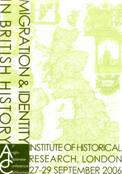5th Anglo-Japanese Conference of Historians
Migration and Identity in British History
27-29 September 2006
at the Institute of Historical Research, Senate
House, London

The
Proceedings, edited by David Bates & Kazuhiko Kondo (Tokyo,
2006)
FOREWORD
The
fifth Anglo-Japanese Conference of Historians (AJC)
was held 27-29 September 2006 at the Institute of Historical Research in
London. David Bates and the Japanese committee have
worked together for the last three years to make the gathering not only
worthwhile but also memorable. The
following pages contain the proceedings of that successful conference.
The AJC has been the most important
triennial occasion for the historians of
It would be unnecessary to reiterate the
difficulties which accompany international academic exchanges and conferences:
they were given an airing in the foreword to the fourth proceedings, State and Empire in British History, published
in 2003. However, mention has also to be made of the heavier burdens
several of the participants have borne these recent years: three headships of
eminent colleges/institute, four presidencies/chairmanships of national
historical societies, a vice-presidency of a national academy, as well as other
important public offices are borne by the core members of the AJC on one or
other side of offshore Eurasia. Furthermore, the ever-growing teaching and
administrative duties hindered several delegates from participating fully in the
three-day conference at the end of September.
The programme kept to the tradition of
holding plenary sessions ranging from the medieval period to the twentieth
century, and took Migration and Identity
in British History as the general theme for 2006. It had been decided by
the end of 2004 in discussion among David Bates and the Japanese committee
members. The committee called for papers in January 2005, and all the practical
arrangements in
The Conference followed Davidfs carefully structured
schedule except for some inevitable changes caused by sudden illness and public
duties. The present proceedings return to the chronological order as planned. There
were eighteen papers and lectures. Among them eleven were delivered by senior
Japanese and British historians, and another seven papers by junior Japanese
who either are completing their doctorates or have just finished them. Junior
sessions were placed between senior ones. This structure worked as expected not
only to secure the high quality of the conference but also to provide young,
promising scholars with public chances to demonstrate their quality. Each
session was chaired by a leading historian and the session paper was responded to
by experts before discussion was opened to the floor. These chairs and
respondents included an additional twenty-one historians. Some guests were
invited to the conference, and many others came voluntarily from various parts
of the world. The final tally of participants amounted to over eighty. All
contributed to informative and thought-provoking discussion in and after each session.
The synergic effects are telling evidence of the thriving state of historical
studies in the two countries as well as of the fruitful international exchanges
and friendship that have developed over the last two decades.
The papers and comments in these proceedings
were submitted within a few months of the conference to allow for the incorporation
of some revisions, the result of both post-delivery discussion and
afterthoughts. The editors have made only technical modifications to the
manuscripts submitted, and the ultimate merit of and responsibility for each
paper lies with its author. The editorship was assisted as for the last proceedings
by the cooperation of Tony Jenkins and Satomi Ohashi.
The conference was supported financially in
Kazuhiko KONDO, chairman of the committee
The AJC 2006 committee
members:
Shigeru
AKITA (Osaka University) ShigeruAkita@aol.com
Yasushi
AOKI (Rikkyo University) yaoki@rikkyo.ne.jp
Keizo
ASAJI (Kansai University) asajik@ipcku.kansai-u.ac.jp
Harumi
GOTO-SHIBATA (
Minoru
KAWAKITA (
Yoichi
KIBATA (University of Tokyo) kibata@waka.c.u-tokyo.ac.jp
Kazuhiko
KONDO (
Toshio
KUSAMITSU (University of the Air) toshio-k@u-air.ac.jp
Takao
MATSUMURA (